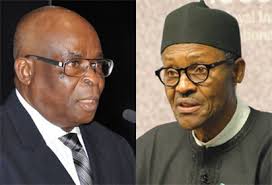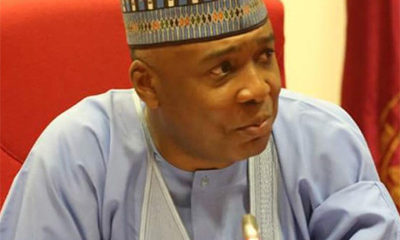News
25 Lawyers Drag PMB To Court, Move To Quash Onnoghen’s Suspension

By our correspondent
Twenty Five constitutional lawyers, today dragged President Muhammadu Buhari before the Federal High Court in Abuja to challenge what they termed as illegal suspension of the Chief Justice of Nigeria, CJN, Justice Walter Onnoghen. President Buhari The suit came on a day the Code of Conduct Tribunal, CCT, sitting in Abuja, okayed indefinite adjournment of proceedings in the non assets declaration charge the Federal Government filed against the suspended CJN. The Plaintiffs, led by human rights activist, Mr. Johnmary Jideobi, posed two legal issues for the determination of the court. They prayed the high court to determine, “Whether by the combined interpretation of Section 153(1) (i) paragraph 21(a) of the 3rd Schedule and Sections 271, 291, 292 and 231 of the amended 1999 Constitution of the Federal Republic of Nigeria [and especially in view of the Supreme Court decision in Elelu-Habeeb vs. AGF (2012) 13 N.W.L.R. (Pt. 1318);], there exists any authority in the 1st Defendant (Buhari) to suspend the 4th Defendant (Onnoghen) as the Chief Justice of Nigeria? As well as, “Whether by the combined interpretation of Section 153(1) (i) paragraph 21(a) of the 3rd Schedule and Sections 271, 291, 292 and 231 of the amended 1999 Constitution of the Federal Republic of Nigeria [and especially in view of the Supreme Court decision in Elelu-Habeeb vs. AGF (2012) 13 N.W.L.R. (Pt. 1318);] the purported suspension of the 4th Defendant as the Chief Justice of Nigeria by the 1st Defendant on the 25th January, 2019 is not unconstitutional?”. Upon determination of the questions, the Plaintiffs, asked the court to hold that President Buhari lacked the constitutional power to suspend Onnoghen as the CJN. “A Declaration of this Honourable Court that by the combined interpretation of Section 153(1) (i) paragraph 21(a) of the 3rd Schedule and Sections 271, 291, 292 and 231 of the amended 1999 Constitution of the Federal Republic of Nigeria [and especially in view of the Supreme Court decision in Elelu-Habeeb vs. AGF (2012) 13 N.W.L.R. (Pt. 1318);] the purported suspension of the 4th Defendant as the Chief Justice of Nigeria by the 1st Defendant on the 25th January, 2019 is of no legal force, unconstitutional and a nullity. “An orders of this honourable court quashing and setting aside [as being unconstitutional and of no legal force] the purported suspension of the 4th Defendant by the 1st Defendant. “An order of this honourable court restoring the 4th Defendant forthwith to his office as the Chief Justice of Nigeria. Likewise, “An order of perpetual injunction of this honorable court restraining the 1st Defendant or any other person acting on his behalf or at his direction from further suspending the 4th Defendant from his office as the Chief Justice of Nigeria”. READ ALSO: The CJN in the political arena Aside President Buhari, other Defendants in the suit marked FHC/ABJ/CS/113/2019, were the National Judicial Council, NJC, the Acting CJN, Justice Tanko Muhammad, and the suspended CJN, Justice Onnoghen. In a 30-paragraphed affidavit that was deposed to by the 1st Plaintiff, the litigants, insisted that President Buhari acted beyond his powers by suspending Onnoghen without recourse to the NJC. “I know as a Nigerian trained Legal Practitioner that the circumstances under which an Acting Chief Justice of Nigeria could be appointed for the Nigerian Federation are limited and do not include the suspension of the holder of that office by an Ex-Parte Order of the Code of Conduct Tribunal emerging from whatever circumstances. “I know as a fact that the 1st Defendant abused his powers and exceeded his constitutional authority when he purported to have suspended the 4th Defendant as the Chief Justice of Nigeria without having recourse to [or by short-circuiting] all known constitutional provisions enclosing the discipline of Judicial officers. “I know that the unconstitutional conduct of the 1st Defendant in purporting to suspend the Chief Justice of Nigeria and unilaterally appointing and swearing in an Acting Chief Justice without the recommendation of the National Judicial Council is extremely offensive to and spiteful of the grundnorm of Nigeria [that is the Constitution], sets a destructive precedence, reeks of utmost bad faith, gravely endangers democracy, undercuts fidelity to Rule of Law, sets a new record in elevated-impunity and desecration of the Constitution with condescending arrogance. “I know that the unconstitutional conduct of the 1st Defendant being impugned herein has set off manifold reaction and shocked the conscience of democrats across the globe as exemplified by the reactions of European Union Mission, United Kingdom and United States of America Missions in Nigeria who issued statements expressing deep concerns regarding the grave development has drawn wide-spread criticisms by Nigerian citizens. “I know as a fact that there is the urgent need for this Honourable Court to speedily review and pronounce on the Constitutionality or otherwise of the actions of the 2nd Defendant which are now threatening the foundation of our democracy. “I know as a fact that despite the unconstitutionality/illegality of the 1st Defendant’s action from which the 3rd Defendant is benefitting from, the 3rd Defendant has commenced performing functions pertaining to the Office of the Chief Justice of Nigeria by purporting to have sworn in Two Hundred and Fifty (250) Election Petition Tribunal Judges on 26th day of January, 2019. “Being a lawyer and a Nigerian citizen, I know as a fact: That the actions of the 1st Defendant being challenged is capable of destroying all what an independent judiciary stands for, create and blossom the culture of impunity and recklessness in public governance and ultimately compromise electoral justice. “That the action of the 1st Defendant that eventuated in the present suit is a grave affront on the sacred doctrine of separation of powers trenchantly consecrated in our Constitution. “In the event the law loses its respect and becomes incapable of commanding obedience (which the action of the 1st Defendant herein precipitates), our Judiciary will fall into odium and disuse thereby opening the floodgate of anarchy, large-scale impunity and erosion of fundamental human rights of citizens. “The actions of the 1st Defendant being impugned herein is capable of putting the Nigerian democracy on a dangerous cliff and eroding the confidence of a common man in the hallowed institution of the Judiciary as his last hope.,” If our democracy crumbles, the Plaintiff’s only source of livelihood (which is the Legal Profession) will be eclipsed, the Courts will close down, citizens will have no place to get reliefs against executive impunity, lawlessness and high-handedness. “There is extremely compelling urgency for this Honourable Court to swiftly intervene to clear the cobwebs by making decisive and clear pronouncements as to the extent of the powers of all the 1st Defendant as it relates to the disciplining of Judicial Officers in Nigeria. “Time is of the essence of this application”, the deponent added. Meantime, the Mr. Danladi Umar-led tribunal said its decision to suspend Justice Onnoghen’s trial was based on the order of the Court of Appeal in Abuja. “Inview of the Court of Appeal order for stay of proceedings and out of respect for the Court of Appeal, the tribunal hereby adjourn this matter sine-die (indefinitely) pending the determination of the Appeal before the Court of Appeal”, Mr. Umar ruled. Only the CCT Chairman and the third member of the panel, Mrs. Julie Amabo, attended the sitting. The second member of the panel, Mr. William Agwadza Atedze, was absent. It will be recalled that Mr. Atedze had openly disagreed with the Tribunal’s Chairman over the procedure adopted in trial of the suspended CJN. Whereas the Chairman, Umar, relied on section 306 of the Administration of Criminal Justice Act, 2015, to reject a motion Justice Onnoghen filed for the tribunal to suspend his trial and await the outcome of his appeal. On the other hand, Mr. Atedze, relied on section 287(3) of the 1999 Constitution, as amended, and plethora of Supreme Court decided cases, to insist that the CCT panel ought to have respected four different interim injunctions that restrained all the parties, including the tribunal, from taking further steps in the matter. In Atedze’s absence, the CCT Chairman, Umar and Amabor, on January 23, issued the ex-parte order President Muhammadu Buhari relied upon to suspend Onnoghen and appoint Justice Tanko Muhammad as the Acting CJN. At the resumed sitting of the CCT on Monday, government lawyer, Mr. Musa Ibrahim, drew attention of the tribunal to an order the Court of Appeal made on January 24. “Ordinarily, the matter was adjourned till today for hearing of the preliminary objection filed by the defendant. But in view of the order from the Court of Appeal, we will be asking for an adjournment pending the ruling of the Court of Appeal”, Musa submitted. In his response, Mr. Kanu Agabi, SAN, who led nine other Senior Advocates of Nigeria and 38 other lawyers that appeared for the suspended CJN, said he was not opposed to the request for adjournment. l Agabi who did not make any reference to the ex-parte order that empowered President Buhari to suspend the defendant, however expressed his displeasure with refusal of the tribunal to furnish his client with records of its proceedings. “We have been on it since January 23. It is very unfortunate that we have literally been on our knees begging for the record of this tribunal”, Agabi stated. Before he adjourned the case indefinitely, Mr. Umar promised to ensure that the CCT records were made available to counsel to the defendant. Meanwhile, security operatives, on Monday, sealed-off Onnoghen’s chambers at the Supreme Court, even as his administrative staff were barred from having access into any of the offices. This was as the Acting CJN, Muhammad, took over and presided over about 10 cases that came up for hearing before the Supreme Court on Monday. In a related development, a former President of the Nigerian Bar Association, Dr. Olisa Agbakoba (SAN), has submitted a petition before the NJC, asking it to take punitive measures against Justice Muhammad for making himself available to be sworn in as the Acting CJN. Agbakoba urged the legal body to determine the propriety of Justice Muhammad, accepting to be sworn-in to replace the suspended CJN, thereby lending himself to constitutional infraction by the executive arm of government. The former NBA boss noted that Justice Muhammad was part of an NJC panel that sanctioned Justice Obisike Orji of Abia State for allowing himself to be sworn-in as Abia State Chief Judge by the state’s governor without the recommendation of the NJC. Agbakoba’s action came as group of lawyers and Civil Society Organisations, staged a peaceful protest in Abuja to register their dissatisfaction with President Buhari’s action against Onnoghen.












